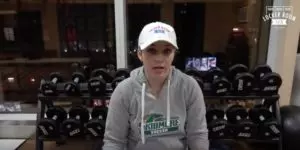Come back every Tuesday for Recruiting Horror Stories™, athletes' first-hand stories on what can go wrong during the recruiting process.
As a high school college athlete who made the honor roll each year in high school, the prospect of going to a prestigious division three college to continue his education and athletic experience was a dream come true for Lance Large…that is, until the disheartening reality of sports recruiting was revealed.
Large had dreamed of playing either collegiate football or lacrosse since he was in middle school. From a young age, he was a multi-sport athlete who loved to compete and have fun while playing every sport imaginable, from golf to soccer to basketball. Once he arrived in high school, Lance became a three-year varsity athlete in football, indoor track and field, and lacrosse. He received praise from his coaches for his exceptional athleticism and was confident in his chances of playing at the next level. He started the recruiting process with eager eyes for the future and an uncanny optimism. Due to his advanced skill set, and dedication to being an excellent student, he was determined to make his dreams come true.
In his junior year of high school, he had a breakout season as a wide receiver for the Greenwich Cardinals (Conn.). The Cardinals were unranked and had little expectations starting the 2017 season. Still, Lance helped lead them to their first state championship game and undefeated regular season in nine years, surpassing all expectations by a landslide. Although their Cinderella story came to an end when they lost the state championship game, Lance was optimistic with the reality that he was even closer to fulfilling his dream. With this breakout year, he finally got his name out to college coaches and gained well-deserved recognition in the recruiting world.
Related: Rate your Coaches, Facilities, and Campus Visits
Throughout the recruiting process, Lance got numerous emails, direct messages on Twitter, and phone calls trying to lure him to each coach's colleges. Still, one Northeastern division three school recruited him exceptionally hard. They continuously called him and texted him every week starting the middle of his fall Junior year season. The recruiter and Lance became very close, sharing personal stories and having seamless conversations where Lance felt a genuine connection and trust for the prospective coach. After consulting with his high school head coach, Lance was reassured that this continuous messaging was a sign that he was a high recruiting target for the college.
Lance was informed through the Division III school that he was invited to their Junior Day over the Spring of 2018. He was “excited to embark on this new journey.” Around 75 athletes are invited to each school's Junior Days and attending the event solidifies an athlete as a top recruit and a legitimate chance of playing there next year. Lance knew that a successful Junior Day would almost guarantee a spot on the team next year.
Throughout the visit, Lance fell in love with the campus, coaches, and potential new teammates. He observed the campus diligently while on tours and listened insightfully to the student-athlete panels. He felt like he truly belonged on this campus and could envision himself attending the college next year.
After a successful Junior Day, Lance was invited to the college's summer camp. Even fewer athletes are invited to this camp, which once again solidified his spot as a top recruit heading into his senior year. At the camps, alternates participate in position drills, one-on-one, and show off their athletic abilities to coaches in person while competing against and with potential recruits. These camps are critical to continue the recruiting process because coaches can implement their programs, drills, or plays to test an athlete's learning curve and how they respond to adversity in a college setting.
At the camp, Lance made numerous great plays in one-on-one situations and displayed his mental and physical toughness by performing throughout a hot summer day. The coach that still stayed in direct contact weekly informed Lance, “You're our top recruit, we're very excited to have you play for us next year.” Lance reciprocated the feeling by explaining to the coach, “you're my number one school, I would love to attend this college next year.” After hearing this positive feedback, Lance knew he was on the brink of receiving an offer. He had good grades, athletics, and a positive relationship with a coach for months. His dream was about to be fulfilled.
Related: Recruiting Horror Story: Will There be a Season?
However, overnight his recruiting process became more cryptic. The coach that he had a fantastic relationship with reached out to him less frequently, sometimes even failing to respond to questions. Lance replayed the conversations at the camp and Junior Day in his head, but he couldn't figure out if he had made a mistake. Ever since he explained that the college was his number one school, they had essentially ghosted him. Lance was confused but never took the lack of communication as a red flag. After all, throughout the heat of the recruiting process, the coach may be busy or involved with family issues. He figured that since he was an important recruit, the coaches would be focusing their attention elsewhere. Hindsight illustrated that this was an egregious red flag in the recruiting process and far from the norm. Lance brushed off these encounters and kept training hard for his upcoming senior season, keeping his dream of playing at the next level alive.
Unfortunately, things never turned around for Lance–the coach from the school that had relentlessly pursued him for months and let him know that he was a “top-recruit” informed him that the Division III school was no longer interested in recruiting him. They didn't acknowledge a reason, or if he did anything wrong, they only stated, “thank you for your time, but we are moving in a different direction.” Lance was heartbroken, saying, “I was made to believe I would get an offer for over a year; I was blindsided by being led on for so long.” Lance's situation exposed how the recruiting process has few regulations, and it's easy to be misled when you trust a coach that believes in your future at their school. Coaches around the country year after year toy with student-athletes' hearts and make them think they're destined to play in college when in reality, they are only backup or fringe options that are being lured into playing at their school so they don't commit elsewhere.
Luckily for Lance, he kept his options open and completed his recruiting process by going to camps in the summer and reaching out to coaches at other schools. However, other athletes aren't as lucky–many times, a coach will lead someone up until the signing day and back out at the last second. This gives the prospective athlete almost no time to find a backup option. After the tumultuous summer, Lance finished his high school football career strongly by completing an undefeated 13-0 season, leading the Cardinals to becoming FCIAC champions, Connecticut state champions, and the 31st ranked team in the nation during MaxPrep's end of season review for high school football. Lance's stellar performance on and off the field led to John Hopkins University's emergence in his recruiting process, where Lance eventually committed to and currently plays. As a Sophomore Wide Receiver, Lance is expected to start for the Blue Jays in their upcoming season and help lead them to contend for a national championship.
Lance hopes his story will help and encourage prospective student-athletes looking to play at the collegiate level. He stressed the importance of keeping your options open because many coaches will want you to commit to them early. However, if the college changes its mind at the last second, the athlete will be scrambling to find another school while the coach effortlessly finds another recruit with no consequences. The coach holds all the power throughout the recruiting process and doesn't technically have to fulfill any promises they may have given an athlete.
In some cases, a college coach will try anything to win an athlete over. As a college athlete, you need to recognize that the recruiting process is a business venture and that the coach is trying to give his team the best chance possible to win. Although it's beneficial to trust and rely on their input, you can never blindly trust a coach you aren't yet committed to.
Have a horror story of your own? Email us at [email protected]
* Originally published on June 7, 2022, by Charlie Ducret







